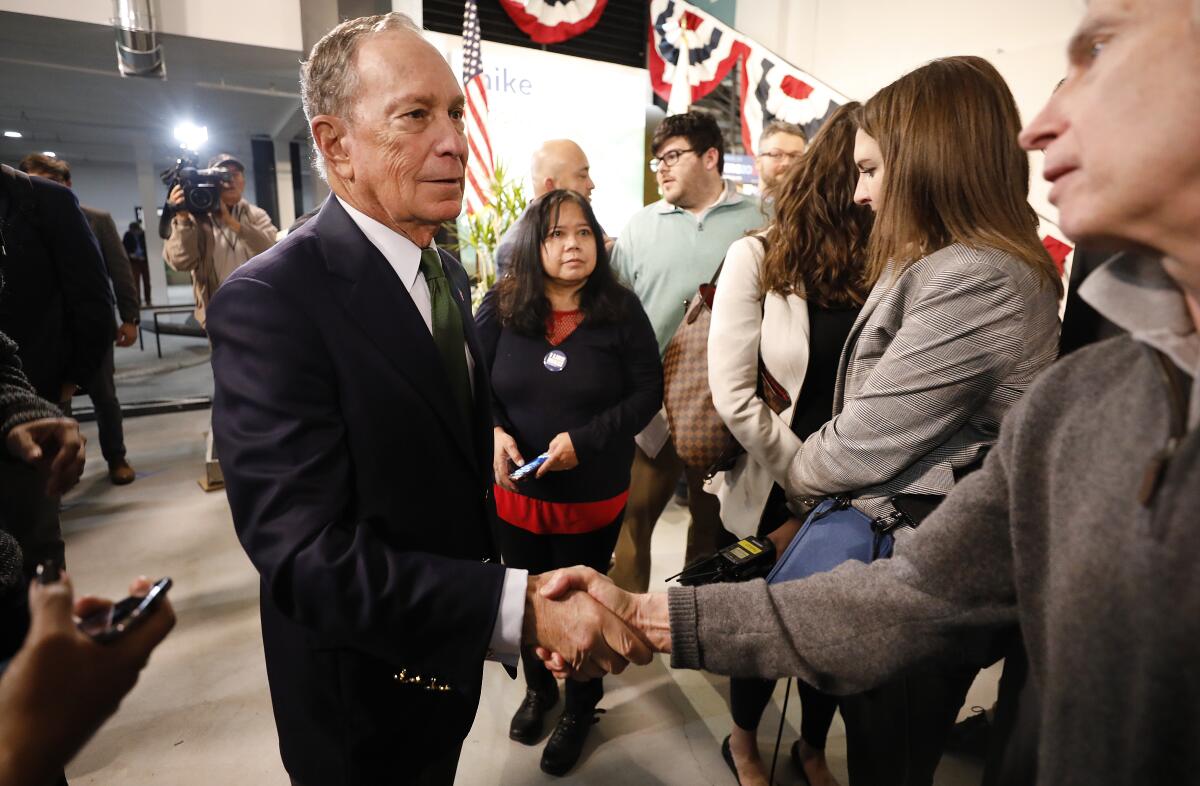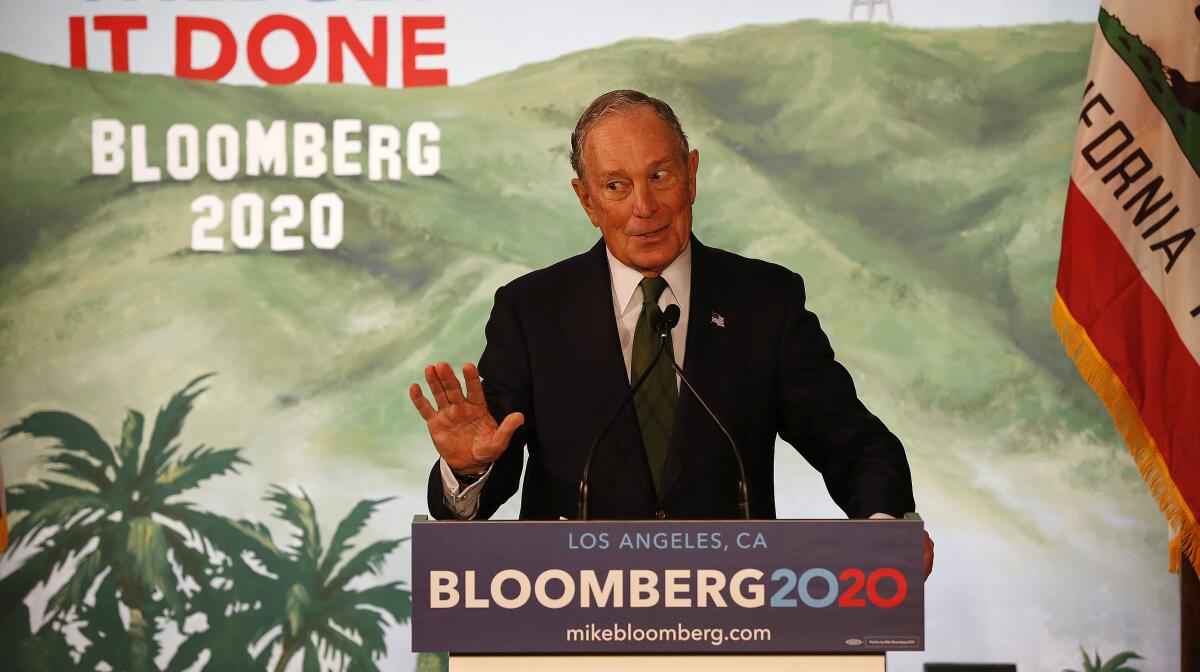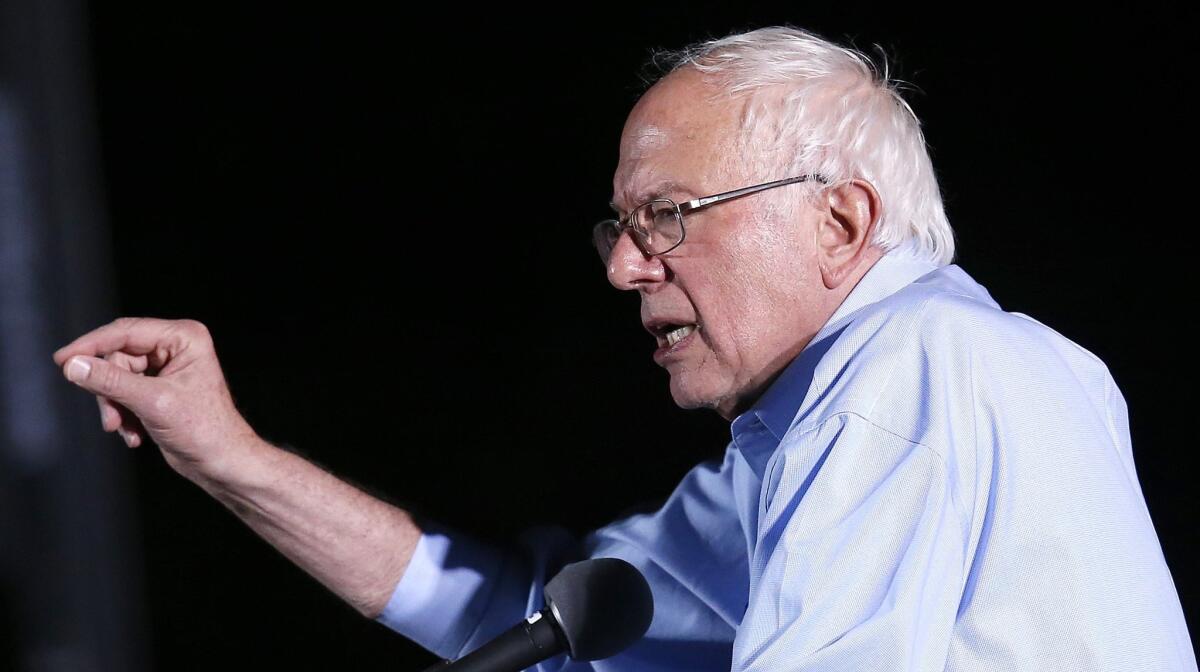2020 candidate Michael Bloomberg says he doesn’t regret backing Iraq war

- Share via
With U.S. and allied forces bracing for renewed military conflict in the Persian Gulf, Democratic presidential candidate Michael R. Bloomberg said Monday that he had no regrets over supporting the 2003 U.S. invasion of Iraq.
“I don’t live in a regret world, and I didn’t make the decision,” the former New York mayor told The Times in an interview in downtown Los Angeles.
Bloomberg recalled that most Americans supported President George W. Bush’s decision to go to war with Iraq in the aftermath of the Sept. 11, 2001, terrorist attacks.

“America wanted to go to war, but it turns out it was based on faulty intelligence, and it was a mistake,” Bloomberg said after celebrating the opening of his campaign office near Pershing Square.
“But I think the people that made the mistake did it honestly, and it’s a shame, because it’s left us entangled, and it’s left the Middle East in chaos through today.”
Bloomberg was elected mayor of New York two months after the 2001 attacks on the World Trade Center and the Pentagon, and he’s highlighting his leadership of the city’s recovery in his campaign for the Democratic presidential nomination.
When the Iraq war started, Bloomberg was a Republican. He supported Bush for reelection in 2004.
A billionaire financial media mogul, Bloomberg was a Democrat until 2001, when he registered as a Republican to run for mayor. He quit the GOP in 2007 and became an independent. Bloomberg registered again as a Democrat in 2018, then announced his candidacy for president six weeks ago.
His backing of the Iraq invasion could cause him trouble in the presidential race, particularly after President Trump ordered the killing of a top Iranian general last week. The fatal drone strike against Gen. Qassem Suleimani has sharply increased tensions across the Middle East and shifted the campaign’s focus to the vast human and financial costs of U.S. military engagements abroad.
Hillary Clinton’s support for the U.S. invasion of Iraq when she was in the Senate wound up being a major liability in her failed 2008 campaign against Barack Obama for the Democratic presidential nomination.
Vermont Sen. Bernie Sanders used Clinton’s vote for the war as a central line of attack against her in the 2016 Democratic race. Sanders has returned to that theme again for the 2020 contest, criticizing former Vice President Joe Biden for voting in the Senate to authorize the Iraq invasion.
In remarks to a few dozen supporters at his Los Angeles office, Bloomberg accused Trump of endangering America by making incendiary, bellicose threats against Iran.
He later faulted Trump for saying he would bomb Iranian cultural sites if Iran retaliates for the killing of Suleimani.
“The culture that he’s talking about is a culture that belongs to the whole world, and destroying our history is not a smart thing,” Bloomberg told The Times. He went on to question the quality of advice Trump gets from his national security advisors.
“He does not have the people that can explain to him why culture is important, why that would be seen as something that would be terrible for the rest of the world and would galvanize people against him and against America,” Bloomberg said.
Bloomberg’s visit to Los Angeles capped a two-day swing across Southern California after stops in San Diego and Riverside.
California is crucial to his strategy for capturing the Democratic nomination. He joined the race too late to effectively compete in Iowa, New Hampshire, Nevada and South Carolina, the states with the first nominating contests next month.
Instead, he is plowing enormous sums of money into advertising in California and more than a dozen other states that vote March 3 on Super Tuesday — and in more than a dozen others that vote after that.
The 77-year-old billionaire and former New York mayor has three months to try to convince voters he should be the Democratic nominee for president. What do Californians think of him?
Nationwide, Bloomberg, who does not accept campaign contributions, has already spent nearly $168 million of his own money on ads, including more than $20 million in California, according to Advertising Analytics, a firm that tracks political ad spending.
Apart from fellow billionaire Tom Steyer, who has put $90 million into ads, none of the other Democrats running for the White House have the wherewithal to spend on that scale. Sanders, the most successful fundraiser in the race, has bought $22 million in ads, Advertising Analytics has found.
Bloomberg has sought to position himself as a moderate who would draw at least some support from Republicans in a general election race against Trump.
Without naming Sanders or Massachusetts Sen. Elizabeth Warren, the top candidates vying for the party’s most liberal voters, Bloomberg criticized their costliest proposals on Monday, such as plans to offer Medicare to all Americans.
“The country’s not ready for some of those things and maybe never will be,” he said. “We want an evolution, not a revolution in this country.”

Bloomberg also said he would not try to repeal a portion of Trump’s 2017 tax overhaul that hit California, New York and some other Democratic-leaning states especially hard — a $10,000 limit on federal income tax deductions for state and local tax payments. Residents of high-tax states are most likely to exceed the $10,000 cap.
“I think that California and New York, at this point, rather than complaining, should try to adjust their budgets to live with the fact that they’re not going to have that deductibility,” he said.
Congress will never restore the full deduction, he said, unless the savings for taxpayers in states like California and New York are matched for Americans everywhere else.
“I’ve always thought in my case, even if taxes are higher, I get something for my money. I will feel proud of living in New York,” he said. “I’m proud of the opportunities that it gave me.”
More to Read
Get the L.A. Times Politics newsletter
Deeply reported insights into legislation, politics and policy from Sacramento, Washington and beyond. In your inbox twice per week.
You may occasionally receive promotional content from the Los Angeles Times.











